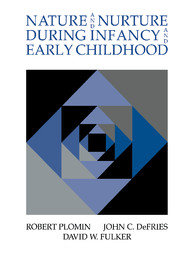Book contents
- Frontmatter
- Contents
- Preface
- Acknowledgments
- 1 Introduction
- 2 Individual differences and group differences
- 3 Quantitative genetics as the basis for a general theory of individual differences
- 4 The Colorado Adoption Project
- 5 Transitions and changes: description and prediction
- 6 Transitions and changes: genetic and environmental etiologies
- 7 Introduction to model fitting
- 8 Fitting sibling and parent–offspring models in the Colorado Adoption Project
- 9 Interactions
- 10 Genotype–environment correlation
- 11 Genetics and measures of the family environment: the nature of nurture
- 12 Conclusions
- References
- Author index
- Subject index
9 - Interactions
Published online by Cambridge University Press: 15 October 2009
- Frontmatter
- Contents
- Preface
- Acknowledgments
- 1 Introduction
- 2 Individual differences and group differences
- 3 Quantitative genetics as the basis for a general theory of individual differences
- 4 The Colorado Adoption Project
- 5 Transitions and changes: description and prediction
- 6 Transitions and changes: genetic and environmental etiologies
- 7 Introduction to model fitting
- 8 Fitting sibling and parent–offspring models in the Colorado Adoption Project
- 9 Interactions
- 10 Genotype–environment correlation
- 11 Genetics and measures of the family environment: the nature of nurture
- 12 Conclusions
- References
- Author index
- Subject index
Summary
It is reasonable to expect that descriptive and explanatory relationships in development involve complex interactions rather than simple main effects. For example, an easy temperament might buffer a child against a difficult environment; conversely, stress may have a disproportionate effect on vulnerable children (Garmezy & Rutter, 1983). Organismic specificity in reaction to environments is one of the major hypotheses that emerges from a thorough review of early experience and human development:
Both from basic and applied data it has become increasingly clear that the relationship of early experience to development will be mediated by the nature of the organism on which the experience impinges. Unfortunately, virtually nothing is known about the specific organismic characteristics which mediate differential reactivity to the early environment. (Wachs & Gruen, 1982, p. 247)
In this chapter, we explore interactions using the CAP data in early childhood. The word “interaction” has many connotations, and it is important to be clear about its use. We limit our search for interactions to statistical interactions, the type of interaction typically derived in analysis of variance that involves the sum of squares remaining after main effects and within-cell variation is removed: “The phenomenon is well named. Interaction variations are those attributable not to either of two influences acting alone but to joint effects of the two acting together” (Guilford & Fruchter, 1973, p. 249).
- Type
- Chapter
- Information
- Nature and Nurture during Infancy and Early Childhood , pp. 224 - 252Publisher: Cambridge University PressPrint publication year: 1988



